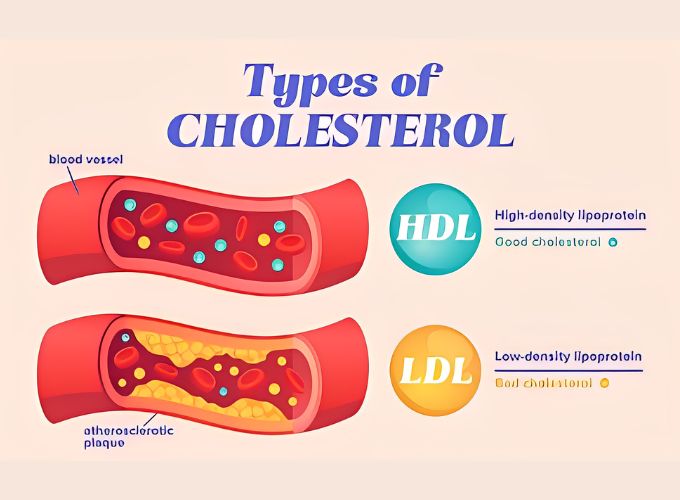Cholesterol, often demonized in health circles, plays a crucial role in various bodily functions. However, when levels become elevated, it poses significant health risks. In this article, we’ll delve into the intricacies of high cholesterol, its effects on longevity, and how individuals can manage it effectively to lead a healthier life.
What is Cholesterol?
Cholesterol is a waxy, fat-like substance found in every cell of the body. It’s essential for building cell membranes, producing hormones, and aiding in digestion. However, the body produces all the cholesterol it needs, and excess cholesterol from dietary sources can lead to health issues.
Types of Cholesterol
Cholesterol travels through the bloodstream in two primary forms: low-density lipoprotein (LDL) and high-density lipoprotein (HDL).
LDL Cholesterol
Often referred to as “bad” cholesterol, LDL cholesterol can build up in the arteries, forming plaque that narrows the arteries and restricts blood flow. This can increase the risk of heart disease and stroke.
HDL Cholesterol
HDL cholesterol, known as “good” cholesterol, helps remove LDL cholesterol from the bloodstream, transporting it to the liver for excretion. Higher levels of HDL cholesterol are associated with a lower risk of heart disease.
Effects of High Cholesterol
Risk Factors Associated with High Cholesterol
Several factors contribute to high cholesterol levels, including genetics, diet, lifestyle choices, and underlying health conditions such as diabetes and hypothyroidism.
Impact on Heart Health
Elevated levels of LDL cholesterol can lead to the accumulation of plaque in the arteries, increasing the risk of coronary artery disease, heart attack, and stroke.
Effects on Blood Vessels
High cholesterol levels can cause blood vessels to become narrowed or blocked, affecting blood flow to vital organs such as the heart and brain. This can result in serious health complications.
Living with High Cholesterol
Lifestyle Modifications
Making healthy lifestyle choices is essential for managing high cholesterol. This includes adopting a heart-healthy diet, engaging in regular physical activity, maintaining a healthy weight, avoiding smoking, and limiting alcohol consumption.
Diet and Exercise
A diet rich in fruits, vegetables, whole grains, and lean proteins can help lower cholesterol levels. Regular exercise, such as brisk walking, swimming, or cycling, can also improve cholesterol levels and overall cardiovascular health.
Medications
In some cases, lifestyle changes alone may not be sufficient to lower cholesterol levels. Medications such as statins, cholesterol absorption inhibitors, and bile acid sequestrants may be prescribed to help control cholesterol levels.
Longevity and High Cholesterol
Studies on Longevity and Cholesterol Levels
Research on the relationship between cholesterol levels and longevity has yielded mixed results. While some studies suggest that lower cholesterol levels are associated with longer life expectancy, others indicate that the relationship may be more complex.
Factors Influencing Longevity
Various factors contribute to longevity, including genetics, lifestyle choices, socioeconomic status, access to healthcare, and overall health. Managing cholesterol levels is just one aspect of maintaining good health and longevity.
Importance of Cholesterol Management
Regardless of its direct impact on longevity, managing cholesterol levels is crucial for reducing the risk of cardiovascular disease and improving overall health and quality of life.
Conclusion
While high cholesterol levels can pose significant health risks, especially concerning heart health, individuals can take proactive steps to manage their cholesterol levels effectively. By making lifestyle modifications, adhering to a heart-healthy diet, engaging in regular physical activity, and, if necessary, taking prescribed medications, individuals can lead healthier lives and potentially mitigate the risks associated with high cholesterol.
FAQs
Can high cholesterol shorten your lifespan?
Elevated cholesterol levels can increase the risk of cardiovascular disease, which can potentially shorten lifespan if left untreated. However, managing cholesterol levels through lifestyle changes and medication can help reduce this risk.
Is it possible to live a long life with high cholesterol?
While high cholesterol levels can increase the risk of certain health issues, many individuals with high cholesterol lead long and healthy lives by effectively managing their cholesterol levels through lifestyle modifications and medication.
How can I manage my cholesterol levels effectively?
Managing cholesterol levels involves adopting a heart-healthy diet, engaging in regular physical activity, maintaining a healthy weight, avoiding smoking, limiting alcohol consumption, and, if necessary, taking prescribed medications as directed by a healthcare professional.
What role does genetics play in cholesterol levels?
Genetics can influence cholesterol levels to some extent, but lifestyle factors such as diet and exercise also play a significant role. Individuals with a family history of high cholesterol should be especially vigilant about managing their cholesterol levels through healthy lifestyle choices.
Are there natural remedies for lowering cholesterol?
While lifestyle modifications such as diet and exercise are considered natural ways to lower cholesterol levels, some dietary supplements and herbal remedies may also have cholesterol-lowering effects. However, it’s essential to consult with a healthcare professional before trying any natural remedies or supplements.
